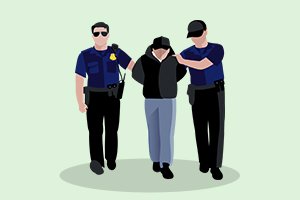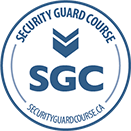Reality vs Fiction
There is NO mandatory use of force, physical skills, or hands on training required by legislation, (other than the theory contained in all basic licensing training), ANYWHERE in Canada, except in B.C.
There is also no mandatory training, prescribed by legislation, required to carry handcuffs in Canada. (B.C. excepted again. See current programs below.)
The Truth
While many Provincial licensing bodies that govern Security Guards can place restrictions on types of handcuffs or permit the deployment and carriage of handcuffs while providing guarding services, NONE, except B.C., have implemented mandatory training standards for either the guards themselves OR instructors who teach them. This gives rise to complex legal concerns.
Hypothetically speaking, a guard company could have a person with no previous experience, no formal training in either use of force or handcuffing, actually teach guards in a hands on program, in house. How is this possible and why?
Provincial governments, except B.C., have quietly agreed that their position is that they feel they have no right to dictate the inner workings of private companies when it comes to arrest, use of force, handcuffing and confinement, done in the furtherance of private interests. Risk management 101. The buck will stop at the company level if they choose to engage in these activities.
This is why you do not see ANY Provincially mandated regulations, legislation or mandatory training requirements for use of force, handcuffing or mandatory minimum requirements for trainers in Canada except in B.C.
Unlike the police who have mandatory standards and legislation governing content, training and “certified” instructor credentials, there is NO SUCH THING as a “certified” Use of Force Instructor for Security Guards in Canada (B.C. excepted of course.) under Provincial legislation. Beware of people who say they are. They may be “approved” to teach Provincial courses, even for Baton use in Alberta as an example, but they are NOT certified or accredited by the government to do so. The government wants no part of this.
Bottom line here is that the enforcement of the law, even on private property, is within the purview of the police. The courts have stated that regular citizens, including private security, should only look to use force or make arrests after “all other efforts” have failed. This includes calling police and waiting. In cases where informed and trained guards and their employers choose to make arrests or use force, they also bear the liability that it attracts.
Point of fact:
- If the police make an arrest while acting in good faith and on reasonable grounds they are protected in law. Security guards are NOT.
- A use of force instructor can be held civilly liable for the content they teach, how they teach it and also what they don’t teach that they probably should. However, while an instructor can subjectively evaluate a guard’s skill level on the day of training and “certify” that they meet a set standard, the instructor cannot be held responsible if the guard goes out the very next day and hurts someone during an arrest using a technique not taught to them OR they seriously fail to perform the skills taught to them the day before.
At the end of the day, it is the employer of the security guards who is ultimately responsible for the proper training and safety of its guards, not the government. The employers are also responsible to ensure that guards get regular updates and refresher training as well as proper P.P.E. relative to their assigned duties. Ministry of Labour standards as well as other legislation speaks to all of this, however it is the civil liability that is most concerning for companies.
Lawsuits abound against companies who hire or employ trainers whose credentials are not measured against Canadian “best practices” or align with court case decisions on the levels of appropriate uses of force, confinement or handcuffing. So how do you know what will or won’t hold up in court when it comes to use of force training, instructors, content, standards etc? Ask a Court Recognized Subject Matter Expert, not a lawyer. They’ve been there, done that and can best advise you, objectively, on these matters, usually for free.
Current Programs
The Justice Institute of B.C. and the Provincial Ministry there state that the “Advanced Security Training (AST)” is a prerequisite for licensed security professionals to obtain the necessary endorsement on their license to carry and use handcuffs in the performance of their duties. AST certificates must be renewed every three years. The course is 24 hours in length, all classroom based. Tuition averages $275 -300.00 with refresher courses running around $125.00.
Alberta Baton training
In order to carry a baton, you must:
- have approval from your employer to carry a baton
- complete an approved 40-hour baton use-of-force training course
- submit a copy of your training certificate with your application
Baton training re-certification is required every 36 months.








